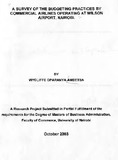| dc.description.abstract | The airline industry is a major player in the Kenyan economy. The industry provides
transport, which is a major factor for the country's economic development. It
contributes 10% to GDP of the Kenyan economy (Kenya Economic Survey 2003).
To be able to operate profitably, airlines need to engage in budgeting and budgetary
control practices. In this regard effective budgeting practices are essential for the
success of the airlines operations. (Horngren, et al (1997) )
The three objectives of the study were, to determine budgeting practices among the
airlines operating at Wilson airport, Nairobi, to determine the factors that the airlines
operating at Wilson Airport consider when undertaking a budgetary process and to
establish the perceived benefits of budgeting by the airlines. To satisfy the objectives
of the study, a research survey was designed and data was collected, using a
structured questionnaire, administered by a drop and pick method. A database was
created using SPSS package and the conclusions were drawn using descriptive
statistics, including frequency tables, percentages, means and standard deviations.
The study established that a majority of the airlines have a corporate vision, mission,
goals and objectives to guide them in the pursuit of their strategic intent. The study
further established that 95.5% of the airlines prepare budgets and 68.2% of airlines
use budgets to plan ahead and co-ordinate, measure and evaluate their
performance. Th~y mainly prepare annual operating budgets, mostly using priority
incremental budgeting method and that they consider past data concerning income
and expenditure, market study results and their flight schedules when preparing their
budgets.
These findings are in agreement with the assertions of Horngren, et al (1997), that
budgets are one of the most widely used tools for annual formal planning and coordinating
the various activities of a business. The budgets are prepared after
considering past data concerning income and expenditure and results of market
analysis.
The budgets also involve taking the actual performance and comparing it with. the
targets set out in the budgets. This includes, analyzing, by gauging the differences
between the actual results and the budgeted figures and taking appropriate action in
order to improve actual performance in the future and/or to revise the planned
figures if this is deemed necessary.
The study also indicates that the most perceived benefits of budgeting practices are
proper planning for the future, giving direction in the company, making greater profits
and improving cash flow. This finding is in agreement with Noll, et al (1998), who
asserts that budgeting is a feed forward process, which makes an evaluation of the
variables that are likely to affect future operations of the enterprise. It predicts the
future with reasonable precision and removes uncertainty to a greater extent.
Further, the study established through the analysis of research data, that budgeting
affects the profitability of the airlines and consequently their financial performance.
This finding is in agreement with Welsch (1976), who asserts that budgeting is the
only comprehensive approach to managing an organization in terms of planning,
implementation and evaluation of plans as a means of improving financial
performance of the company. | en |

